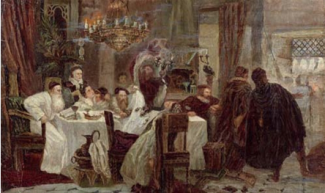Event

The persecution and expulsion of Jews from Spain – or Sepharad – played a pivotal role in Jewish history and collective memory. In the modern era, the historical legacy of Sepharad inspired a wide and diverse literary corpus that included prose, poetry, and drama. Fictional accounts of the dispossession of the acculturated Sephardi elite, the terror of the Inquisition, and the secret lives of forced converts offered readers uniquely Jewish tales of romance, violence, and suspense. Blending history and fiction, past and present, Jewish authors liberally drew on images of the Sephardic past to grapple with their own cultural identities and political circumstances, as well as to captivate their audiences and promote their publications. This lecture will trace the fictional afterlives of Sepharad, a hybrid and immensely popular literary corpus that circulated across the modern Jewish world, confounding generic, cultural, ethnic, and national distinctions along its convoluted path.
Speaker:
Marina Mayorski is the 2024-2025 Goldin Family Postdoctoral Fellow in Jewish Studies at the University of Pennsylvania. She holds a BA and MA in comparative literature from Tel Aviv University. She recently received her PhD from the Comparative Literature Department at the University of Michigan. Her dissertation, titled “Guilty Pleasures: Popular Fiction and the Formation of Jewish Cultural Modernity,“ examines the transnational development of popular literary culture in Hebrew, Ladino, and Yiddish in the nineteenth and twentieth centuries. She is especially interested in the role of translation and adaptation of popular fiction in shaping modern notions of gender, sexuality, race, ethnicity, and political belonging. She will also continue working on translation of modern Ladino literature and on developing digital tools for research and pedagogy of Sephardic culture. At Penn, her research will focus on the ways in which Jewish writers and readers used popular literature to imagine their Jewish Others and construct Ashkenazi and Sephardi ethnic identities. She is looking forward to engaging Penn’s faculty and students, especially in contexts of translation theory and practice, history of the book, and digital humanities, and to conducting research in Penn’s extensive Judaica collections.
Light reception to follow.
Sponsors:
The Kutchin Seminar Series in the Jewish Studies Program, with the support of Penn’s Comparative Literature and Literary Theory Program, and Department of Francophone, Italian, and Germanic Studies.
